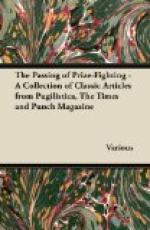* * * * *
THE NEW GAME.
If Hubbard were not my friend I should describe him as one of the most amiable and most muddle-headed of mankind. Under the influence of his mind things that are quite clear become confused and lose themselves in long vistas of statement and sub-statement and sub-sub-statement, and a plain tale is darkened until at the end nothing is left of what it originally was. If you don’t believe me listen to what follows.
We were sitting in the drawing-room one evening recently; the various topics of the day having been more or less exhausted, somebody proposed a round game as a diversion. Hubbard saw his chance and dashed in. “Yes, by Jove,” he said, “let’s have the new game of ‘Likenesses;’ it’s a perfectly ripping game. I played it the other day and never laughed so much in my life.”
“How do you play it?” I said.
“Oh,” said Hubbard, “it’s one of the easiest games in the world. All you have to do is to keep your mind clear and remember what you are driving at.”
“Right,” I said. “But what are you driving at?”
“Well,” said Hubbard, “one of us goes out or stops his ears and the rest choose somebody.”
“There’s nothing very new about that,” I said; “I’ve played it a thousand times.”
“Wait a bit,” said Hubbard, “and don’t be so ready to plunge. I tell you this is an entirely new and original game.”
“Let him,” said somebody else, “get on with it in his own way or we shall be here till past midnight. Go ahead, Hubbard.”
“Well,” said Hubbard, “you choose somebody to be a likeness. When your man comes in again he begins to ask questions.”
“Vegetable, animal or mineral,” said Butterfield, “I knew it was.”
“No, it isn’t,” said Hubbard. “The man who has gone out and has come in says to you, What food does the person you’ve chosen remind you of? and you say tapioca pudding or beef-steak and kidney pie.”
“But,” I said, “there’s nobody in the whole wide world who reminds me of either of those things.”
“Well, you can choose your own food,” said Hubbard. “If you don’t like tapioca pudding you can answer scrambled eggs. Only scrambled eggs must remind you of the person you have in your mind. Then you go on to the next man, and you ask him what cloth he reminds you of, and he answers tweed or Irish frieze or best Angola.”
“Can anybody,” said Butterfield, “tell me what ‘best Angola’ means? I’ve seen it often in my tailor’s bills; mostly, I think, as waistcoats, but I’ve never known what it really is. If I had to guess now I should say it is something composed in equal parts of fancy waistcoats, tapioca pudding and scrambled eggs.”
“Well, you’d be wrong,” said Hubbard; “it’s nothing of the sort. When you have got as far as scrambled eggs your man ought to begin to have a faint glimmering—”
“But,” I said, “there’s the tapioca pudding. What are you going to do with that? You can’t be allowed to play fast and loose with that.”




